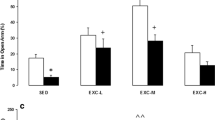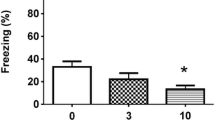Abstract
Rationale: Post-training treatments (drugs, stress, ECS) influence retention performance of laboratory animals, sometimes in a strain-dependent way. In a previous study, an interaction between the effects of morphine and of the non-competitive N-methyl-d-aspartate (NMDA) receptor antagonist MK-801 on retention performance was observed, in random bred mice. Objective: In the present research, we have investigated the effects on retention of C57BL/6 (C57) and DBA/2 (DBA) mice exerted by a) morphine, b) MK-801 and c) naltrexone. Further, we have studied in both strains the effects exerted on retention by combinations of morphine and MK-801, and of MK-801 and immobilization stress. Finally, the naltrexone-reversibility of the interaction between immobilization stress and MK-801 was also assessed. Methods: All treatments were administered immediately after training in mice tested in a passive avoidance task. Drugs were injected IP. Results: The results of our experiments showed that morphine and the non-competitive NMDA receptor antagonist MK-801 exerted dose- and time-dependent facilitatory effects on retention performance in C57 mice, and dose- and time-dependent impairments in DBA mice. Further, dose- and time-dependent deleterious effects on retention performance, in the C57 strain, and dose- and time-dependent enhancing effects, in the DBA strain, were observed following post-training IP naltrexone administration. MK-801 enhanced, in both strains, the effects of morphine. Finally, immobilization stress enhanced in both strains the effects of MK-801 and these effects were naltrexone-reversible. Conclusions: In conclusion, the results of this study show that the genetic make-up of the mice played an important role in all the effects observed, and, in particular, in the interaction between the opioid and the glutamatergic systems. Further, the naltrexone reversibility of the interaction between MK-801 and immobilization stress suggests that opioid mechanisms were involved.
Similar content being viewed by others
Author information
Authors and Affiliations
Additional information
Received: 1 November 1998 / Final version: 20 April 1999
Rights and permissions
About this article
Cite this article
Cestari, V., Ciamei, A. & Castellano, C. Strain-dependent effects of MK-801 on passive avoidance behaviour in mice: interactions with morphine and immobilization stress. Psychopharmacology 146, 144–152 (1999). https://doi.org/10.1007/s002130051100
Issue Date:
DOI: https://doi.org/10.1007/s002130051100




